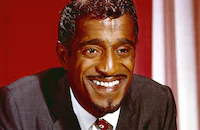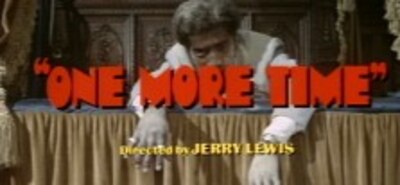One More Time

Brief Synopsis
Cast & Crew
Jerry Lewis
Sammy Davis Jr.
Peter Lawford
Maggie Wright
Leslie Sands
John Wood
Film Details
Technical Specs

Synopsis
Charlie Salt and Chris Pepper, owners of the Salt and Pepper Club, turn to Chris's influential twin brother, Lord Sydney Pepper, when their nightclub is closed by the police. Lord Sydney refuses to help pay the fine, but Chris manages to enjoy some good times in London's fashionable night spots by posing as his wealthy brother. Chris returns to Lord Sydney in a second attempt to borrow money, but finds his brother has been murdered. Seizing the opportunity, Chris changes clothing with the corpse and declares that it is Chris who has died. The Salt and Pepper Club holds an elaborate funeral for its owner, and the new Lord Sydney invites Charlie to his mansion for a reconciliation and offers his unsuspecting former partner a job as controller of the estate. Eventually, Charlie learns "Lord Sydney"'s true identity, and the two of them discover that Chris's brother was a diamond smuggler murdered by accomplices who now believe Lord Sydney to still be alive. Following a hectic chase after the murderers, the police take over, leaving Salt and Pepper free to resume their pleasure-seeking life.

Director

Jerry Lewis
Cast

Sammy Davis Jr.

Peter Lawford
Maggie Wright

Leslie Sands

John Wood
Sydney Arnold
Edward Evans
Percy Herbert
Bill Maynard
Dudley Sutton
Glyn Owen
Lucille Soong
Esther Anderson
Anthony Nicholls
Allan Cuthbertson
Cyril Luckham
Moultrie Kelsall
Julian D'albie
Gladys Spencer
Joanna Wake
Juliette Bora
Florence George
Amber Dean Smith
Lorraine Hall
Carmel Stratton
Thelma Neal
Davie Trevena
Norman Mitchell
Richard Goolden
Geoffrey Morris
Norman Pitt
George Mcgrath
Mischa De La Motte
Walter Hopsburgh
John Nettles
Peter Reeves
Crew
Ronnie Bear
Brian Blamey
William Butler
Dimity Collins
Sammy Davis Jr.
Bobby Doyle
Milton Ebbins
Frank Ernst
George Frost
Alice Holmes
Gerry Humphreys
Peter Lawford
Ken Lawton
Michael Pertwee
Jackie Rae
Les Reed
Les Reed
Ken Ryan
Geoff Stephens
Jack Stevens
Ernest Steward
Gerry Turner
Terry Witherington

Film Details
Technical Specs

Articles
One More Time
Unfortunately there are complications. Such as that Lord Pepper's life isn't all wine and roses--it seems he's managed to double-cross both Interpol and a bunch of international diamond smugglers, and there are those who want him dead. In fact, they've already killed him--that was how Chris managed to swap places (which means Salt thinks his buddy Pepper is dead, and that Lord Pepper is his murderer).
Of course, these details are largely incidental. This is not a movie that has much interest in its own plot. In fact, much of what passes as "plot" is just an excuse to watch two old friends hang out together.
And any mention of that friendship takes us back to what this exercise is really all about. Peter Lawford and Sammy Davis, Jr. were real-life friends, whose friendship was itself a commercial product, marketed and sold to audiences around the world. The brand name given by the press to this phenomenon was "The Rat Pack," although it is highly unlikely that Lawford, Davis, Frank Sinatra, Dean Martin, and Joey Bishop ever referred to themselves by that name. Regardless, the name served its function--and even today, the phrase "Rat Pack" still conjures up all the right associations of Sinatra et al.
This was a group of like-minded entertainers who not only spent time together socially, but took to performing together as well. Live shows advertised to feature any one of this group could suddenly and without warning turn out to include some or all--an unpredictable payoff that obviously appealed very strongly to the kinds of audiences who frequented Las Vegas shows in the first place. The end result was to powerfully enhance the marquee value of each of these performers individually.
They also appeared in films together, with One More Time (1970) occurring towards the tail end of the cycle. Lawford was in some ways on the outs with the Rat Pack by this point.
You see, Lawford had been married to Patricia Kennedy, making him JFK's brother-in-law for a while. And the story goes that in the spring of 1962, Lawford asked Sinatra if he could put his Presidential brother-in-law up as a guest at Sinatra's Palm Springs house. Sinatra then went to great lengths to accommodate the President's needs, only to be snubbed when Kennedy's advisors worried about the President seeming to chummy with a man whose friends included Mafia figures. This would have been insulting enough, but then Kennedy went and stayed with Bing Crosby--not just anyone, mind you, but a rival crooner! Sinatra was humiliated and furious, and did what he could to shun Lawford in revenge.
Lawford and Sammy Davis, Jr. had been paired as nightclub owners Chris Pepper (Lawford) and Charlie Salt (Davis) in the 1968 comedy Salt and Pepper, directed by Richard Donner. It made enough money to warrant a sequel, which swapped out Donner for Jerry Lewis.
Perhaps here is where we can best understand this theme of personal friendships that become professional partnerships that become commercial products. It started in 1946, when future Rat Packer Dean Martin first started performing with comedian Jerry Lewis, and the two were suddenly catapulted into overwhelming success. For the next ten years, the Martin-Lewis team rode an unprecedented wave of popularity and acclaim.
That partnership ended in 1956, and Lewis moved into a solo career as the writer, director, and star of his own comedy vehicles. The 1963 film The Nutty Professor marked the high point of Lewis' solo work, but did not mark its end. Instead, this was the point at which Lewis' career seemed to bifurcate into two contradictory things. On the one hand, Lewis wanted to be seen as a serious artist who continued to experiment and explore new avenues for his creativity; on the other, Lewis' films sputtered at the box office and faced increasingly disappointed critics. This period of decline culminated in 1972 with the mad ambition of The Day the Clown Cried, in which Lewis set out to make a comedy about Nazi concentration camps and ended up with a film so uncommercial it has remained unreleased and unseen ever since.
Sandwiched in amidst this period of commercial disfavor and perceived creative troubles, One More Time is an anomaly. It is the only feature film that Lewis directed that did not also star him, and it was a project he neither initiated nor wrote. It would be easy to dismiss it as an aberration, a mere footnote, if it didn't seem quite so pertinent.
Whether Lewis meant it to nor not, whether he even fully realized it, One More Time plays like Lewis' attempt to return to the Martin-Lewis glory days. Peter Lawford's cool-cat performance is basically Lawford channeling his best Dean Martin impersonation, while Sammy Davis, Jr. mugs his way through one slapstick set piece after another in the Jerry Lewis role. Most accounts of this film dutifully note that although Lewis doesn't appear on screen at any point, his voice is heard dubbed over a minor character's towards the end. This bit of trivia obscures the larger truth--Jerry Lewis is on screen throughout, in spirit, in nearly everything Davis does.
The loose structure of the film would have allowed space for the two leads to extemporize their comedy routines, as Martin and Lewis had done. But Lawford and Davis aren't Martin and Lewis, and instead of flights of comic invention, Lawford and Davis seem content to just enjoy each other's company. The two men shared a house together on location for the shoot, and idled away their off-hours with endless parties--this is the atmosphere that spills over to the film itself.
There are isolated moments of absurdity, like when Lawford and Davis appear to age noticeably while waiting for their slow-moving butler to serve lunch, but these gags seem imposed on the two stars more than emerging from their own comic identities.
For that matter, the broad farce and silly sight gags of One More Time are also of a piece with the spirit and style to the Carry On... cycle of slapstick farces--and indeed, was photographed by the same cinematographer as the Carry On... films, Ernest Steward.
The screenplays for both One More Time and its predecessor Salt and Pepper were written by Michael Pertwee. Best known for his work writing such television shows as The Saint, Danger Man, and Alfred Hitchcock Presents, Pertwee was also a playwright, and brother of Doctor Who star Jon Pertwee.
The film is nominally set in London, but this is a London of the imagination: full of lords and ladies, tea parties, dolly birds and stiff upper lips. At one point, Davis finds a secret passage into a castle dungeon where he finds Peter Cushing as Dr. Frankenstein and Christopher Lee as Count Dracula--just because.
This was one of Sammy Davis, Jr.'s last film appearances, and only a short-lived career revival for Peter Lawford. Jerry Lewis released only one other film for the next ten years. For all the enthusiasm implied by a title like One More Time, there is an elegiac air that hangs over this exercise. It is a film out of its own time--eagerly pining for the swinging London of the decade previous but unaware that time has moved on.
By David Kalat
Sources:
Sammy Davis, Jane Boyar, and Burt Boyar Sammy: An Autobiography
Chris Fujiawara, Contemporary Film Directors: Jerry Lewis
James L. Neibur and Ted Okuda, The Jerry Lewis Films: An Analytical Filmography of the Innovative Comic
Jonathan Rosenbaum, "The Lewis Contradiction," http://www.jonathanrosenbaum.net/2013/10/the-lewis-contradiction/
James Spada, Peter Lawford: The Man Who Kept Secrets

One More Time
Quotes
Trivia
Notes
Released in Great Britain in December 1970. Film is a sequel to Salt and Pepper, q. v.

Miscellaneous Notes
Released in United States 1970
Released in United States 1970














